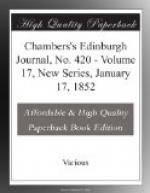There was a coal-tax, popularly known as the Richmond duty, which was levied for many years, for the benefit of one family, but was abolished some time ago. Its origin, and the especial circumstance which, gossip saith, more immediately led to its infliction, are not a little curious, perhaps instructive. The first Duke of Richmond of the present line was a son of Charles II. by Louise Rene de Pennevant de Querouaille, a French lady, better known to us as the Duchess of Portsmouth, to whom Otway dedicated his ’Venice Preserved’ in such adulatory terms. This son, when only nine years of age, was created a Knight of the most noble Order of the Garter; and his mother, with the proverbial taste of her country, arranged a more graceful mode of wearing the blue ribbon, which, as we see in old portraits, was till then worn round the neck of the knight, with the George pendent from it. The duchess presented her son to the king with the ribbon thrown gracefully over his left shoulder, and the George pendent on the right side. His majesty was delighted, embraced his son, commanded that the insignia of the order should always be so worn, presented the youthful knight with 1s. per ton, Newcastle measure, upon all coals shipped in the Tyne for consumption in England, and secured the munificent parental gift by patent to the young duke and his heirs for ever. Honi soit qui mal y pense.
After the fortunate family had enjoyed this revenue for about a century and a quarter, the then Duke of Richmond, a personage said to be wise in his generation, negotiated the sale of his patent with the government; and on the 19th of August 1799 the Lords of the Treasury agreed that the sum of L.499,833, 11s. 6d., the price of a perpetual annuity of L.19,000, should be paid for the surrender of the duke’s right. This enormous sum was accordingly actually disbursed by the Exchequer in two payments, and the obnoxious impost on the Tyne coal-trade was abolished some thirty years afterwards—by which time the Treasury had been repaid much more than it had advanced, a circumstance inducing a belief that his Grace sold his inheritance much too cheaply. The estimate of the quantity of coals consumed in the United Kingdom, and exported during the last year, reaches the staggering amount of 50,000,000 of tons—a tremendous advance, which proves, if nothing else, that if, as some will have it, we are an ‘old’ country, the capacity for hard work as well as power of consumption increases marvellously with age. At anyrate the three great business localities I have partially indicated are stupendous facts, the full significance of which will be fully comprehended by all and every one who may choose to compare these slight outline sketches with the great originals.




